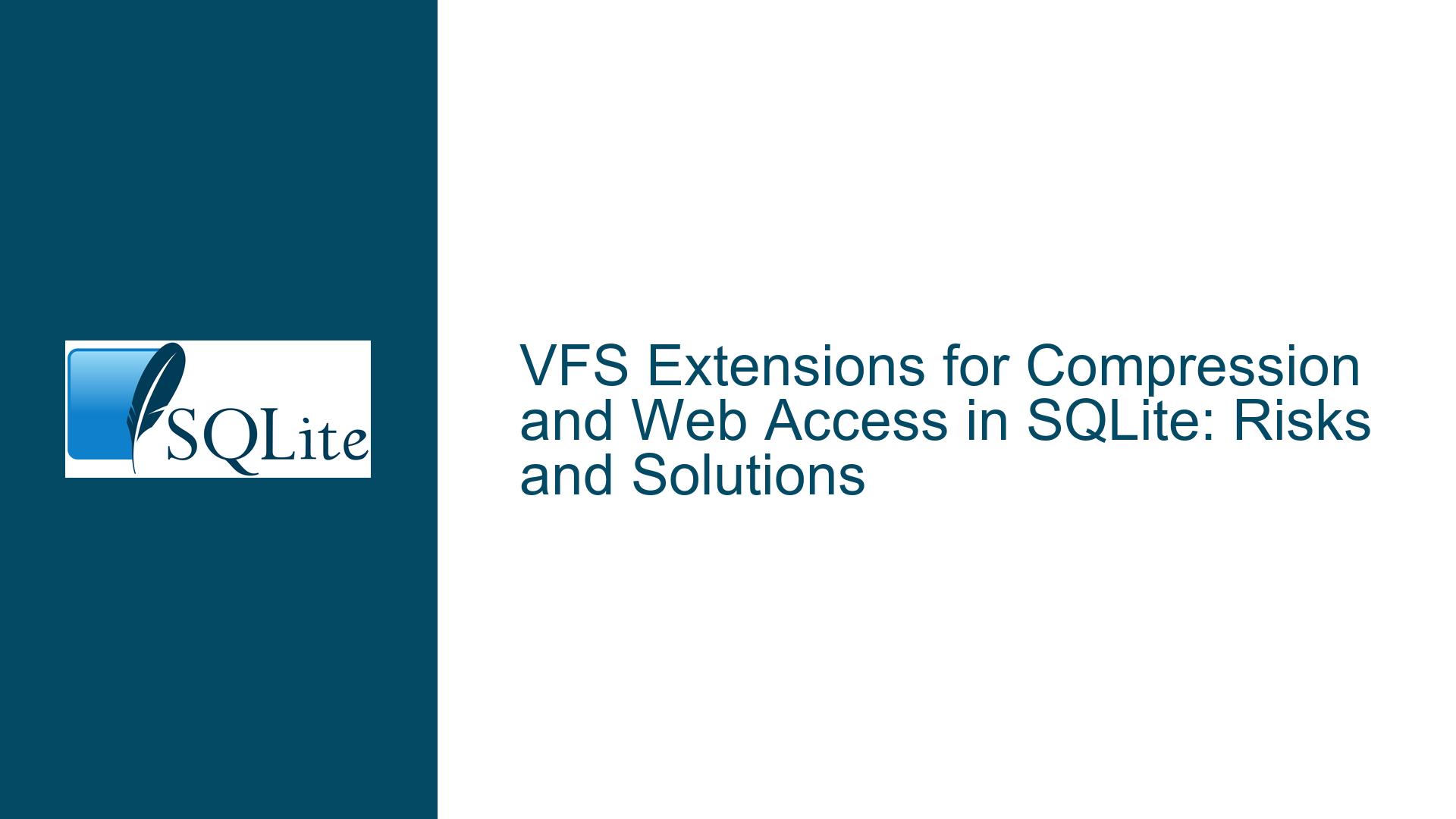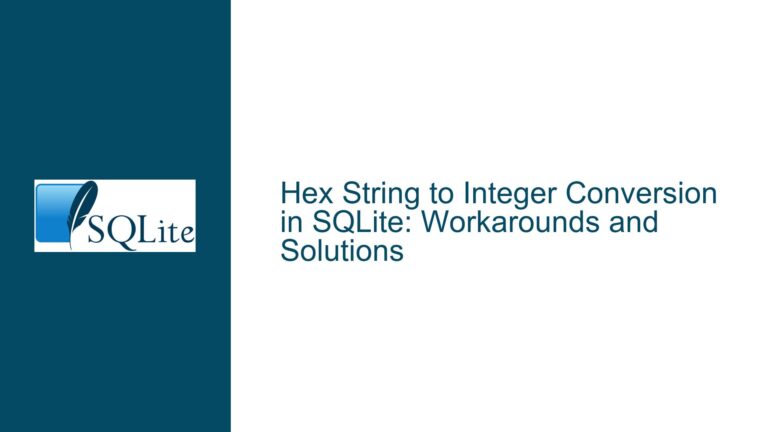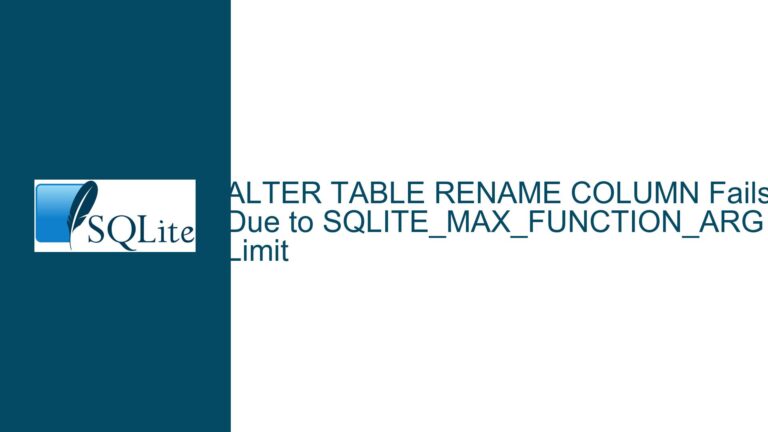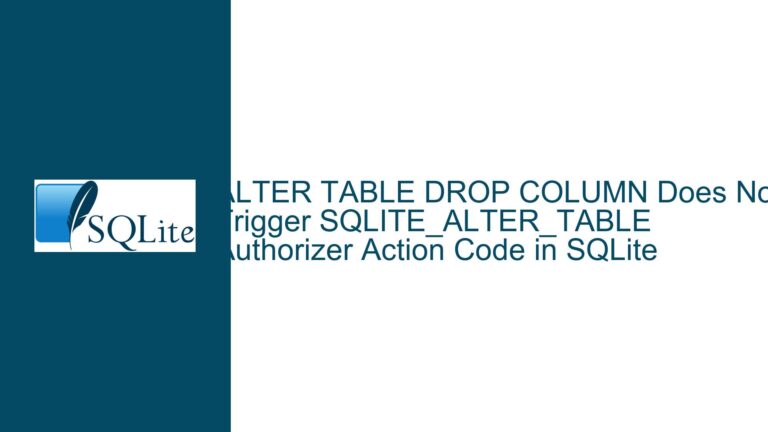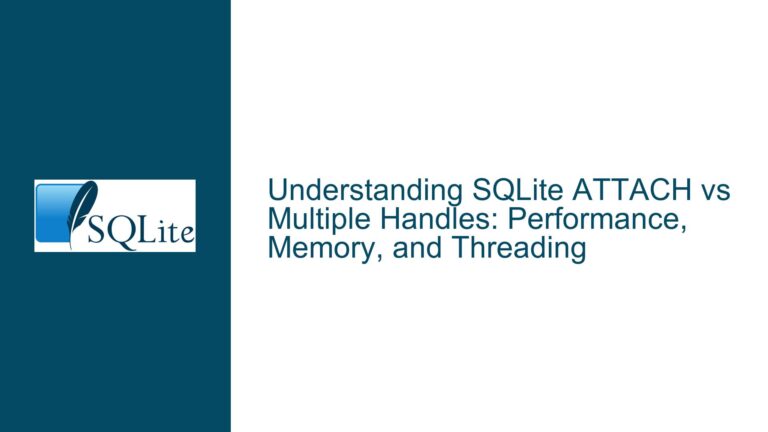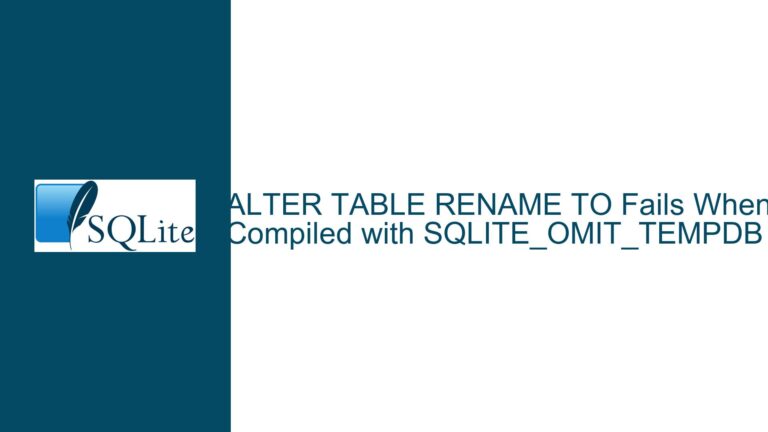VFS Extensions for Compression and Web Access in SQLite: Risks and Solutions
VFS Extensions for Compression and Web Access in SQLite
SQLite is renowned for its lightweight, serverless, and embedded nature, making it a popular choice for a wide range of applications. However, as data volumes grow and the need for efficient storage and access mechanisms becomes more pressing, developers often seek to extend SQLite’s capabilities. Two such extensions are the zstd_vfs for read/write storage compression and the web_vfs for read-only access to database files via HTTP/HTTPS URLs. These extensions aim to make SQLite more applicable in "big data" settings, where traditional methods like storing JSON.gz files on cloud storage are common. However, these extensions come with their own set of challenges and risks, particularly when it comes to data integrity, performance, and portability.
The zstd_vfs extension is designed to provide compression capabilities similar to ZIPVFS but using the Zstandard (zstd) compression algorithm. This can be particularly useful in scenarios where storage space is at a premium, and the trade-off between compression ratio and speed is acceptable. On the other hand, the web_vfs extension allows SQLite to access database files stored on remote servers via HTTP/HTTPS, which can be beneficial in distributed environments where data needs to be accessed from multiple locations.
While these extensions offer significant advantages, they are not without their drawbacks. The zstd_vfs extension, for instance, may introduce performance overhead due to the compression and decompression processes. Additionally, the web_vfs extension, while useful for read-only access, may suffer from latency issues and potential data integrity concerns, especially in environments with unreliable network connections. Furthermore, both extensions are not rigorously tested to meet SQLite’s high standards for quality, testing, and portability, making them unsuitable for critical OLTP (Online Transaction Processing) applications.
Risks Associated with Untested VFS Extensions
The primary risk associated with using untested VFS extensions like zstd_vfs and web_vfs is the potential for data corruption and loss. SQLite’s robustness and reliability are largely due to its rigorous testing and adherence to ACID (Atomicity, Consistency, Isolation, Durability) properties. However, when third-party extensions are introduced, these guarantees may no longer hold, especially if the extensions have not been thoroughly vetted.
For zstd_vfs, the risk lies in the compression and decompression processes. If the compression algorithm introduces errors or if the decompression process fails, the data may become corrupted. This is particularly concerning in scenarios where the database is frequently updated, as the risk of corruption increases with the number of write operations. Additionally, the performance overhead associated with compression and decompression can lead to slower query execution times, which may be unacceptable in performance-critical applications.
The web_vfs extension, on the other hand, introduces risks related to network reliability and data integrity. When accessing a database file over HTTP/HTTPS, the network’s latency and reliability become critical factors. If the network connection is slow or unstable, query performance may degrade significantly. Moreover, if the remote server hosting the database file is compromised or if the data is intercepted during transmission, the integrity of the data may be compromised. This is particularly concerning in environments where sensitive data is being accessed or where data integrity is paramount.
Another significant risk is the lack of portability. SQLite is designed to be highly portable, with support for a wide range of platforms and environments. However, third-party extensions like zstd_vfs and web_vfs may not be as portable, especially if they rely on platform-specific features or libraries. This can limit the applicability of these extensions in certain environments and may require additional effort to ensure compatibility across different platforms.
Implementing Robust Solutions for VFS Extensions
To mitigate the risks associated with using VFS extensions like zstd_vfs and web_vfs, it is essential to implement robust solutions that address potential issues related to data integrity, performance, and portability. Below are some strategies that can be employed to ensure the safe and effective use of these extensions.
Data Integrity and Corruption Prevention
Ensuring data integrity is paramount when using VFS extensions that involve compression or remote access. For zstd_vfs, it is crucial to implement mechanisms that detect and correct errors introduced during the compression and decompression processes. One approach is to use checksums or hashes to verify the integrity of the data before and after compression. If a discrepancy is detected, the data can be recompressed or decompressed to prevent corruption.
For web_vfs, data integrity can be ensured by using secure communication protocols like HTTPS, which encrypts data during transmission. Additionally, implementing checksums or hashes for the database file can help detect any tampering or corruption that may occur during transmission. It is also advisable to use redundant storage solutions, where multiple copies of the database file are stored on different servers. This ensures that if one server is compromised or if the data is corrupted during transmission, a backup copy is available.
Performance Optimization
Performance is another critical factor to consider when using VFS extensions. For zstd_vfs, the performance overhead associated with compression and decompression can be mitigated by optimizing the compression algorithm’s parameters. For instance, adjusting the compression level can help strike a balance between compression ratio and speed. Additionally, using multi-threading or parallel processing techniques can help reduce the time required for compression and decompression, thereby improving query performance.
For web_vfs, performance can be optimized by reducing network latency and improving data transfer speeds. One approach is to use content delivery networks (CDNs) to cache the database file closer to the end-users, thereby reducing the distance data needs to travel. Additionally, implementing data compression for the database file before transmission can help reduce the amount of data that needs to be transferred, thereby improving transfer speeds.
Portability and Compatibility
Ensuring portability and compatibility is essential when using VFS extensions, especially in environments where the database needs to be accessed from multiple platforms. For zstd_vfs, it is crucial to ensure that the compression library used is compatible with all target platforms. This may involve using cross-platform libraries or implementing platform-specific code to handle differences in how compression is handled across different operating systems.
For web_vfs, portability can be ensured by using standard protocols like HTTP/HTTPS, which are widely supported across different platforms. Additionally, implementing fallback mechanisms, such as local caching of the database file, can help ensure that the database remains accessible even in environments where network access is limited or unreliable.
Testing and Quality Assurance
Given that zstd_vfs and web_vfs are not rigorously tested to meet SQLite’s high standards, it is essential to implement thorough testing and quality assurance processes when using these extensions. This includes unit testing, integration testing, and stress testing to ensure that the extensions perform as expected under various conditions. Additionally, it is advisable to conduct regular audits and code reviews to identify and address any potential issues before they lead to data corruption or loss.
Backup and Recovery Strategies
Implementing robust backup and recovery strategies is crucial when using VFS extensions, as it provides a safety net in case of data corruption or loss. For zstd_vfs, regular backups of the uncompressed database file should be taken to ensure that data can be recovered in case of corruption during compression or decompression. Additionally, implementing incremental backups can help reduce the time and storage space required for backups.
For web_vfs, backups should be taken of the remote database file and stored in a secure location. This ensures that if the remote server is compromised or if the data is corrupted during transmission, a backup copy is available. Additionally, implementing automated backup processes can help ensure that backups are taken regularly and consistently.
Documentation and Community Support
Finally, it is essential to document the use of VFS extensions thoroughly and seek community support when needed. This includes documenting the installation and configuration process, as well as any known issues and workarounds. Additionally, engaging with the SQLite community and seeking feedback from other developers can help identify potential issues and improve the overall quality and reliability of the extensions.
In conclusion, while VFS extensions like zstd_vfs and web_vfs offer significant advantages in terms of storage efficiency and remote access, they also introduce risks related to data integrity, performance, and portability. By implementing robust solutions that address these risks, developers can safely and effectively use these extensions to extend SQLite’s capabilities in "big data" settings. However, it is crucial to approach the use of these extensions with caution, particularly in critical OLTP applications, and to implement thorough testing, backup, and recovery strategies to ensure data integrity and reliability.
